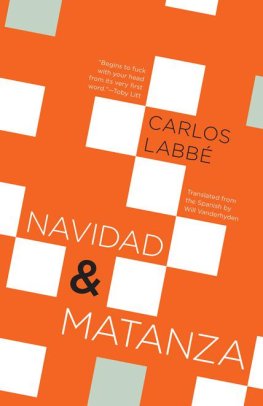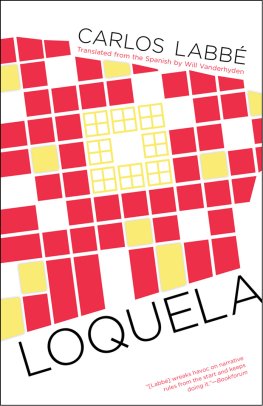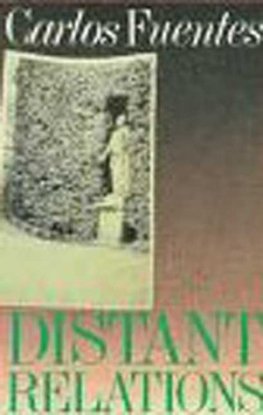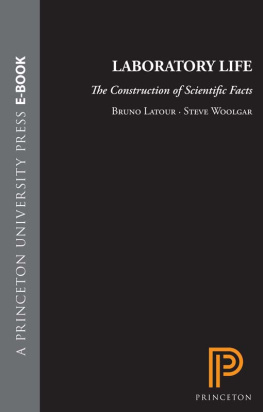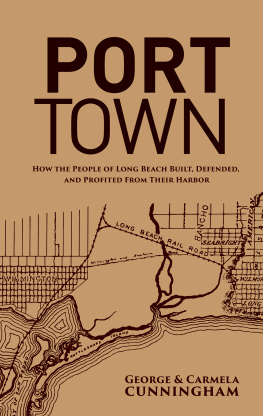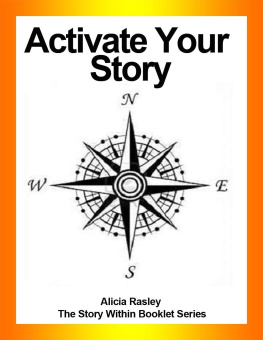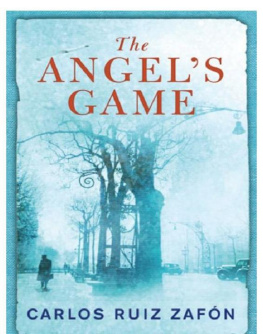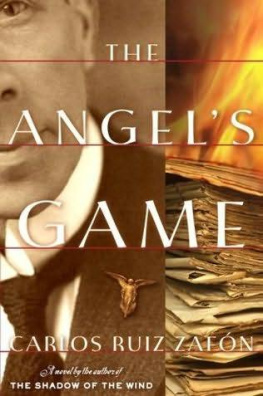Carlos Labb
Navidad & Matanza
To Mnica Ros and the Labb Jorqueras. And to the other six participants of this novel-game, especially to the ones who also tried to make it to the final square.
MY NAME IS DOMINGO. Actually, Domingo is my password here in the laboratory. Just by uttering this name which I chose I can enter bedrooms and bathrooms, I can make phone calls, obtain food and drink, access the temperature, hygiene, and communication systems, send and receive email, carry out Internet transactions to purchase any supplies we need. Without it, Id be trapped in my room. If I were to suffer a psycholinguistic disruption, or if the effect of some microorganism rendered me voiceless, Id just die of starvation. Its not that my life doesnt matter to anyone; it has to do with the nature of the project. Its not even top secret, as we used to joke, rather, to the world, it doesnt exist. So if for some reason I was to forget my name, I wouldnt just die of thirst and hunger, Id die empirically: the possibility of anyone remembering me would die as well. If the project culminates in success, Ill be able to return to Santiago, get married, have children, maybe make a career as a gastroenterologist. If the project fails, or if I fail, as occurred with Lunes, Miercoles, Jueves, and Viernes I fear it may be occurring with Sabado the organization will be sure to eliminate me. You see, my choice of this allegory wasnt made on a whim. The project really does resemble a board game, with dice and squares and all of that. Because there is only one way to stay alive: make it to the end.
NO TRACE OF ME will remain. For that reason, Ive written all of this in code. My password isnt really Domingo. Also, Ill probably insert pieces of pure, hard reality into the story Im going to tell you. Does that sound okay?
Let this be the beginning: we were seven. Lunes, Martes, Miercoles, Jueves, Viernes, Sabado, and Domingo. We met in 1996, in the Biology Department at Universidad de Chile. We werent all taking the same classes, but we got acquainted in a creative writing workshop, which was offered as an elective. In a way, our friendship was based in literature. We were the only students in the department interested in what is beyond science. Juan Carlos Montes you already know that I wont be using real names is my father. Although that wasnt the only reason he chose us. We were among the best students in the whole School of Sciences. We got the best grades in molecular biology, neuroscience, and genetics. And all of us enjoyed writing stories.
ALL OF THIS REMINDS me of the case of Navidad and Matanza, in the summer of 1999. At the time I was writing for a journal whose proprietor was a notorious business executive, and because of this we were tacitly forbidden to write about the most popular topic in the office: disappeared-detainees. This was, of course, during Pinochets judicial hearing in London. But even more important was the fact that, at the beginning of the year, Judge Guzman had identified the body of our secretarys father in an excavation in the Atacama Desert. Suddenly what had been a really worn out subject took on an archaic and distant force that came to completely disrupt our work environment. And so, Im not sure if it was out of blind solidarity, or a desire to get out of the office, but during those two months we journalists felt oddly compelled to investigate, anywhere we could, news of abductions, disappearances, or reports of missing persons in the province. I began looking into the case of a brother and sister who disappeared in Navidad.
Navidad, a small town in Region VI, is the gateway to that obscure stretch of coastline between Santo Domingo and Pichilemu. A couple miles farther along is its twin village, the no less bucolic beach town, Matanza. The area enjoyed several months of touristic splendor when the secret VIP club of a famed international resort temporarily occupied the beach during the last summer of the past millennium. There are about ten thousand members in this club who, every five years via unknown channels, receive conceptual instructions and coordinates of latitude and longitude announcing the unfolding of a unique, unprecedented event. That year, the members received at their doors a young Australian man who handed them an invitation and recited a supposedly unpublished poem by Edgar Lee Masters entitled The Hotel Room, in whose final lines appeared the password: Transensorial beyond seasons / the Spanish groom said / matanza y natividad, heaven and hell.
The business executive Jose Francisco Vivar recalls that his family received the Australian visitor in September of 1998. Vivar knew it was a representative of the VIP club and he was pleased the event was going to take place in Chile. Since the trip to Navidad wouldnt be that expensive, hed be able to bring along his wife and their two children, Bruno (then 19) and Alicia (14). I have nothing else to add, he said, in a report in a daily newspaper from that time, just that after twenty years of enjoying these events of infinite relaxation, alone or with my wife, I thought the experience would be even better with my whole family. But that was not the case. At that point, according to the report, Jose Francisco Vivar broke down. Wed been in Navidad for two weeks. One afternoon, a Thursday, Teresa and I left the children, who wanted to stay at the beach a while longer. We went back to the hotel where we showered, changed clothes, and got something to eat. At seven we planned to meet the children in the Room of Shadows, a site the organization had set up to put on a variety of shows, a sort of Matanza bazaar. That night, Patrice Dounn, the Congolese thereminist was performing. But Jose Francisco and Teresa never saw their two children again. The image of the two youths shouting goodbye and running toward the waves is the last that they have. Alicia and Bruno officially disappeared the afternoon of January 18th, 1999.
TO THIS DAY, police investigators have continued to add sightings of Bruno Vivar to the case file of the disappeared Navidad siblings. Every summer since the disappearance, a dozen witnesses from different areas of the central coast have reported seeing a young man fitting his description: striped T-shirt in various combinations of primary colors; shorts or bathing trunks; leather sandals; extremely thin, hairless legs; disheveled, raggedly-cut hair, sometimes brown, sometimes dyed red. As if the last image his parents had of him remained burned on the retinas of so many people who never knew him (the press coverage was as intense as it was brief), they always see Bruno Vivar lying on the sand, face down on his towel, staring out to sea, looking disdainfully through some photographs, or swimming in silence. Of course, other accounts add specific and equally disturbing details: drinking in hotel bars, beer from cans or double shots of whiskey which he pays for with a credit card issued in the United States, while with the other hand he caresses a die which he spins like a top on the lacquered surface of the bar; sitting on a terrace at noon, noisily eating French fries; reading, in the dining hall, a letter delivered to the hotel weeks before; rolling the die and then writing another letter never sent by local mail.
This information comes from diverse sources: guards, waiters, clerks, receptionists, and janitors, who, at the time, also hoped to put together the cases missing pieces, but who only succeeded in helping the police declare unverifiable the possibilities of homicide or kidnapping. It has been tacitly assumed that Bruno Vivar a legal adult simply abandoned his family without warning, which is not a crime in Chile.
The most perplexing question is why the name of Alicia Vivar, the fourteen-year-old girl, appears only twice in the case file. Especially after reviewing in detail the reports of repeated sightings of her brother, Bruno. Because Bruno has never once reappeared alone. The accounts agree that he arrives at hotel parking lots in a variety of expensive cars always driven by a man whose smile also appears in police archives, although in another section: Boris Real.

